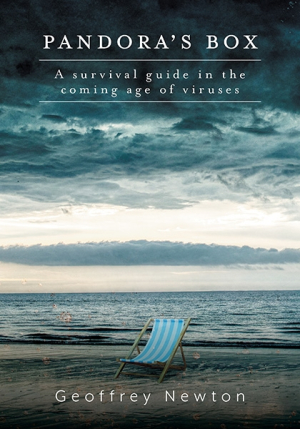Pandora's Box
A Survival Guide in the Coming Age of Viruses
Pandora’s Box is a thought-provoking science book with recommendations for avoiding future pandemics.
Geoffrey Newton’s Pandora’s Box is an intriguing scientific exploration of how viruses work and what the world can do to prevent future pandemics.
The book asserts that by destroying ecosystems and endangering biodiversity, humans are responsible for two of the main causes of viral pandemics: pushing animal species out of their natural habitats and diminishing people’s exposure to diverse biomes, which weakens humanity’s natural resilience as a result. It also posits that viruses aren’t good or bad per se, and that there would be no human beings without viruses in the first place. Its arguments are supported by a multiplicity of sources and examples, ranging from medical journals to healthy elders.
Drawing on his pharmaceutical background, Newton explains how the body defends itself in the face of a pathogen attack and puts forward theories as to why some people’s immune systems can fight off these intruders better than others. In his quest to find an explanation, he looks at superagers: centenarians who retain most of their physical and mental capacities well beyond what’s expected. Covering their upbringings, cultural backgrounds, and approaches to stress, the book muses through how they have been able to survive two pandemics, even without access to modern medicine in the case of the 1918 influenza pandemic.
By going over a history of the planet, and in particular viruses’ role in the birth of mammals, the book’s assertions of how humans can protect themselves from viruses gain context and strength: the holistic approach to explaining longevity (biodiversity is only one factor explored; stress responses and mental resilience are also addressed) is engaging in its complexity, and almost every claim is backed up by footnotes specifying its sources. These are, for the most part, drawn from scientific journals and books, lending credence to the volume’s overall thesis.
The book’s scientific topics are made intelligible by explanations of even the smallest pertinent concepts, like what a virus is in the first place. The inclusion of both brief biographical profiles of long-lived people (such as a woman who was over 100 years old before she was ill for the first time) and natural phenomena (such as the comparatively extraordinary longevity of bats) takes otherwise complicated concepts and shows their relevance to everyday life. In the same vein is a chapter dedicated to how a person can boost their immune system, including various supplements and vitamins, adding practical and knowledgeable advice to the mix.
There are a few errors and tangents that detract from the book’s otherwise scholarly presentation, though. For example, in a section exploring the leap from dinosaurs to Neil Armstrong, the latter is credited with being the first man to set foot on another planet. And in a section about changes within the field of genomics in the 1990s, a general overview of the time period includes the bizarre claim that feminism died in that decade and was replaced by divas like Madonna.
Nonetheless, Pandora’s Box is a thought-provoking science book with recommendations for avoiding future pandemics.
Reviewed by
Carolina Ciucci
Disclosure: This article is not an endorsement, but a review. The publisher of this book provided free copies of the book and paid a small fee to have their book reviewed by a professional reviewer. Foreword Reviews and Clarion Reviews make no guarantee that the publisher will receive a positive review. Foreword Magazine, Inc. is disclosing this in accordance with the Federal Trade Commission’s 16 CFR, Part 255.

